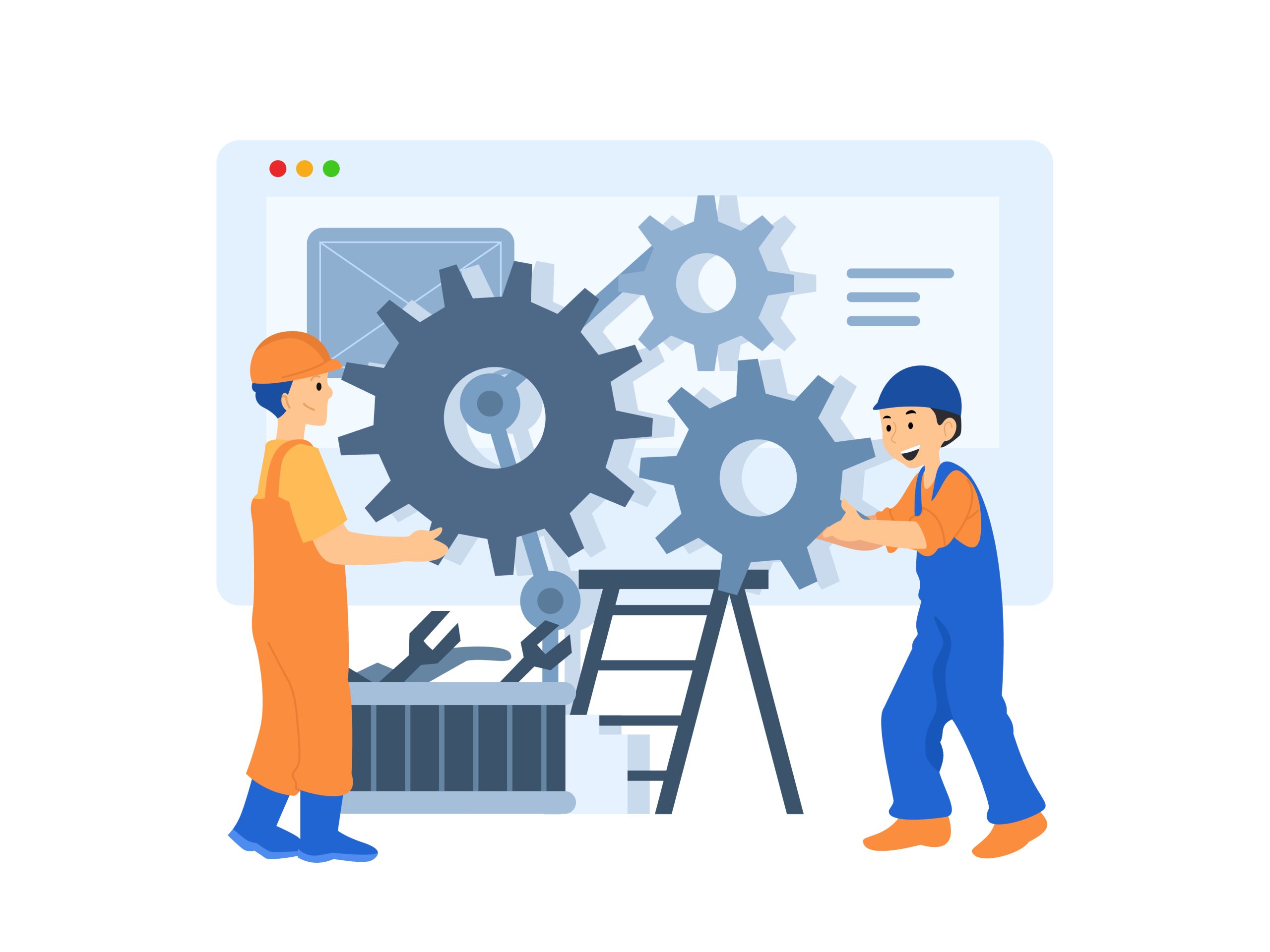What is Website Maintenance: Beginner’s Guide
 Justin Young
Justin YoungTo achieve long-term online success, you must keep up with ongoing website maintenance. Investing time and resources into keeping your site updated, secure, performant, and user-friendly will create a solid foundation for growth while building trust with your audience.
- content updates and revisions
- importance of website maintenance
- maintaining a website
- plugin updates
- theme updates
- website backup
- Website Maintenance
- website management
- website performance optimization
- website security
- website updates

Introduction: What is Website Maintenance: Beginner's Guide
website maintenance, importance of website maintenance, website management, maintaining a website, website updates
Keeping your website up-to-date and functioning optimally is vital for running a successful online presence. Website maintenance involves regular updates, monitoring, and upkeep to ensure that your website provides a seamless user experience. In this beginner's guide, we will explore the importance of website maintenance and provide practical tips for efficiently managing and maintaining your website.
Website maintenance covers vital areas, including regular backups of your website's data, software, and plugin updates, monitoring security vulnerabilities, optimizing site speed and performance, and ensuring all links work correctly.
Regular backups are essential to protect your website's data from potential loss or damage. Regularly creating backups of your files and database can quickly restore your website to a previous state if any issues arise.
Updating software and plugins is another crucial aspect of website maintenance. Keeping your content management system (CMS), themes, and plugins up to date ensures that you have installed the latest features, bug fixes, and security patches, which helps protect your website from potential vulnerabilities that hackers could exploit.
Monitoring security vulnerabilities is vital in today's digital landscape, where cyber threats are prevalent. Regularly scanning for malware or suspicious activities can help identify potential security breaches before they cause significant damage to your site or compromise user data.
Optimizing site speed and performance is essential for providing a positive user experience. Slow-loading websites can lead to high bounce rates as visitors lose patience waiting for pages to load. Regularly optimizing images, cleaning up unnecessary code or scripts, and implementing caching techniques can significantly improve site speed.
The Key Elements of Effective Website Maintenance
website security, website backup, website performance optimization, content updates and revisions, plugin updates, theme updates
Website maintenance is crucial for ensuring website security, performance, and freshness. With increasing cyber threats, it is vital to implement robust security measures to protect your website from hackers and malware attacks. Strong passwords, SSL certificates, firewall protection, and regular security audits are some steps that can safeguard your website and customer data.
Regular backups are essential to restore your website quickly in case of any data loss or technical issues. Even if your website is secure, unforeseen events like server crashes or accidental deletions can occur. A reliable backup system ensures that you can restore your website quickly.
Optimizing website performance is equally vital for providing a smooth browsing experience to visitors. Slow-loading websites can drive away potential customers and negatively impact search engine rankings. Regularly monitoring page load times, optimizing images and videos, caching techniques, and minimizing code bloat are some strategies to enhance your site's performance.
Content updates and revisions are vital for maintaining the relevance and freshness of your website. Regularly updating product information, blog posts, and news sections or adding new content helps engage users while improving search engine visibility.
1. Ensuring Website Security:
Website security measures, SSL certificate installation, regular security audits, protection against hacking attempts
Ensuring the security of a website involves several essential steps, and one of the most fundamental is the installation of SSL certificates. These certificates are crucial in encrypting the data transmitted between the user's browser and the website server. This encryption ensures that sensitive information remains secure and protected from unauthorized access. By installing SSL certificates, businesses can establish trust with their users and provide a secure browsing experience.
Another critical aspect of maintaining website security is conducting regular security audits. These audits help to identify potential vulnerabilities and weaknesses in the website's security system and enable businesses to implement necessary patches or updates. By performing these audits routinely, companies can stay ahead of hackers and mitigate any potential risks before they escalate.
To protect against hacking, businesses must adopt a multi-layered approach that includes robust firewalls, intrusion detection systems, and comprehensive access controls. These measures help to prevent unauthorized website access and detect any suspicious activity. By implementing these security measures, businesses can significantly reduce the cyber-attack risk and safeguard their website and users.
2. Regular Website Backups:
website backup solutions, automatic backup tools, offsite backups for data protection
Regularly backing up your website is crucial for maintaining a safe and dependable online presence. With the increasing risk of cyber attacks, data breaches, and accidental data loss, having a solid backup strategy is essential for all website owners.
Website backup solutions offer a range of options to protect your valuable data. Automatic backup tools can be set up to perform regular backups without any manual intervention, providing peace of mind knowing that your website's content and database are safeguarded.
One critical aspect of a comprehensive backup strategy is offsite backups. Storing your backups offsite ensures that even if your server or hosting provider experiences a catastrophic failure or physical damage, your data remains intact and accessible. Offsite backups act as an additional layer of protection against unforeseen events, allowing you to quickly restore your website to its previous state.
You can mitigate the risks associated with data loss by implementing regular website backups and utilizing automatic backup tools with offsite storage capabilities. This proactive approach not only safeguards your valuable information but also minimizes downtime in the event of any unfortunate incidents.
Investing in reliable website backup solutions is an investment in your online presence's long-term success and security. Don't wait until it's too late to protect your data and ensure uninterrupted access to your website.
3. Optimizing Website Performance:
Website speed optimization techniques, caching mechanisms implementation,
By implementing effective website speed optimization techniques, businesses can significantly enhance the user experience and boost conversion rates. One such technique is the use of caching mechanisms. Caching allows web browsers to store static files locally, such as images and CSS files, which reduces the need for repeated requests to the server and results in faster page load times.
Through caching mechanisms, websites can deliver content more efficiently and reduce server load, improving overall performance and a smoother browsing experience for users. Additionally, implementing browser caching headers and leveraging content delivery networks (CDNs) can enhance website speed by distributing content across multiple servers geographically.
The Benefits of Regularly Maintaining Your Website
Benefits
- Improved search engine rankings
- Enhanced site security and protection against cyber threats
- Increased loading speed and better overall performance
- Reduced downtime and improved reliability
Regularly maintaining your website is about keeping it up-to-date and providing a better user experience that can significantly enhance the satisfaction and engagement of your visitors. By investing time and effort into maintaining your website, you are essentially investing in the interaction and attention of your visitors.
One of the key benefits of regular maintenance is that it provides a better user experience. Users who visit a well-maintained website are more likely to interact positively with it. A website that loads quickly has updated content, and smooth navigation creates a seamless browsing experience, keeping visitors engaged and encouraging them to explore further.
In addition, regular maintenance ensures that all links on your website work correctly. Broken links can frustrate users and may lead them to leave your site altogether. Regularly checking for broken links and fixing them promptly ensures that users can easily navigate through your website without any interruptions.
Hiring Professional Help or DIY: Which Approach Works Best?
- Evaluating your technical skills and available resources- Comparing the costs of outsourcing vs. doing it yourself
When it comes to website maintenance, deciding whether to hire a professional or do it yourself can be difficult. Both options have pros and cons, but ultimately, the choice depends on your specific needs and circumstances.
Outsourcing website maintenance tasks to professionals offers several advantages. It lets you focus on your core business activities without worrying about the technical aspects of maintaining a website. Professional web developers have the expertise and experience to handle complex tasks efficiently, ensuring your website runs smoothly and stays updated.
Additionally, outsourcing can save you valuable time and effort. Instead of spending hours learning how to fix issues or update plugins, you can delegate these tasks to experts who can complete them quickly and effectively. This gives you more time to focus on other essential aspects of your business.
On the other hand, some people prefer the DIY approach. It gives them more control over their website's maintenance and offers flexibility in making necessary changes. DIY enthusiasts may enjoy learning new skills and taking an active role in managing their online presence.
However, it's essential to consider the potential downsides of the DIY approach. Website maintenance requires technical knowledge and expertise that may take significant time and effort to learn. Without proper training or experience, attempting complex tasks could result in errors or even compromise the security of your website.
Ultimately, the decision to hire a professional or do it yourself depends on your budget, time availability, technical skills, and desired level of control over your website's maintenance. It's crucial to evaluate these factors carefully before making a decision that aligns with your short-term goals and long-term vision for your online presence.
Maintaining an E-commerce Website: Additional Considerations to Keep in Mind
- Managing product inventory and ensuring accurate information
Managing inventory can be daunting, especially when it comes to keeping track of many products, variations, and updates. However, technology can help simplify the process. With advanced software solutions and innovative tools, businesses can implement robust inventory management systems that leverage AI algorithms and data analytics to provide real-time insights into stock levels, sales trends, and demand forecasting.
Automated inventory management systems can ensure product information remains up-to-date across all channels. These systems can sync with various platforms, including e-commerce websites and point-of-sale systems, to ensure accurate stock information is always available to online shoppers and in-store customers. Companies can streamline their inventory management process and maintain correct stock records by adopting such strategies.
- Monitoring payment gateways and transaction processes
Monitoring payment gateways has several advantages, including detecting and promptly resolving issues or anomalies. By closely keeping track of transaction processes, businesses can quickly identify any potential errors or fraudulent activities, thereby minimizing the risk of financial loss. Moreover, monitoring enables companies to track the performance of their payment gateway providers, ensuring they meet the required standards for security and reliability.
In Conclusion: Prioritize Your Website Maintenance to Ensure Long-term Success
In conclusion, prioritizing website maintenance is crucial for ensuring long-term success in the digital landscape. Consistently updating and maintaining your website can enhance its security, performance, and user experience.
Regular updates are essential to keep up with evolving technology and industry standards, which include software updates, bug fixes, and feature enhancements that can improve the functionality of your website. Ignoring these updates can lead to compatibility issues and potential vulnerabilities that may compromise your website's security.
Furthermore, maintaining optimal performance is vital for retaining visitors and encouraging repeat visits. Slow loading times and broken links can frustrate users and drive them away from your site. Regular maintenance allows you to identify and resolve performance issues promptly, ensuring a seamless browsing experience for your audience.
Prioritizing website maintenance also demonstrates professionalism and reliability to your users. It shows you value their time and trust by providing a secure and well-functioning platform.
Ultimately, neglecting website maintenance can have detrimental effects on your online presence. It not only hinders user experience but also negatively impacts search engine rankings. Search engines prioritize regularly updated, secure, fast-loading, and user-friendly websites.
To achieve long-term online success, you must keep up with ongoing website maintenance. Investing time and resources into keeping your site updated, secure, performant, and user-friendly will create a solid foundation for growth while building trust with your audience.
Related Posts
 How Often Should You Do Website Maintenance?
How Often Should You Do Website Maintenance?
The Importance of Regular Website Maintenance Website maintenance, website upkeep, website management, website performance Managing a website involves multiple tasks, including updating content, design elements, and functionality. To prevent potential vulnerabilities, it’s crucial to keep your site up-to-date with the latest technologies, security patches, and bug fixes. Monitoring critical website performance metrics includes page load […]
 The Importance of Website Maintenance in 2024 and Why Businesses Need It For Long-Term Success: Ensuring Optimal Performance and User Experience
The Importance of Website Maintenance in 2024 and Why Businesses Need It For Long-Term Success: Ensuring Optimal Performance and User Experience
Understanding the Significance of Website Maintenance Website maintenance, website management, website performance, user experience Maintaining a website requires consistent monitoring, updating, and troubleshooting to ensure optimal performance. This involves conducting routine checks for broken links, optimizing loading speed, fixing bugs or errors, and ensuring compatibility across various devices and browsers. The significance of website maintenance […]
 Best Website Maintenance Tools for your Business in 2024
Best Website Maintenance Tools for your Business in 2024
Discover the best website maintenance tools to keep your online presence running smoothly this year website maintenance, website management, website performance, website upkeep Best Website Maintenance Tools for your website is crucial to ensure a positive user experience. A well-maintained website enables visitors to navigate quickly, find relevant information, and interact positively with your brand. […]
 How Much Does Website Maintenance Cost?
How Much Does Website Maintenance Cost?
Know website maintenance costs upfront to avoid surprises and keep your website running smoothly.
Did you know that users take only 50 milliseconds (0.05 seconds!) to form an opinion about your website? Within this short period, they decide whether or not they want to stay. Keeping your website up-to-date is a critical way to show its quality.
The Cost of maintaining a website pays off in the end because 47% of customers will visit a company’s website before deciding whether or not to make a purchase. Therefore, it is essential to ensure everything looks fresh and runs smoothly!
 10 Essential Questions to Ask When Choosing the Best Web Hosting Services
10 Essential Questions to Ask When Choosing the Best Web Hosting Services
When selecting the optimal web hosting services, asking these ten essential questions is crucial. web hosting services, importance of web hosting, choosing the right web hosting provider, website performance Choosing the right web hosting provider is crucial for ensuring that your website is accessible to users at all times. They provide the necessary infrastructure and […]